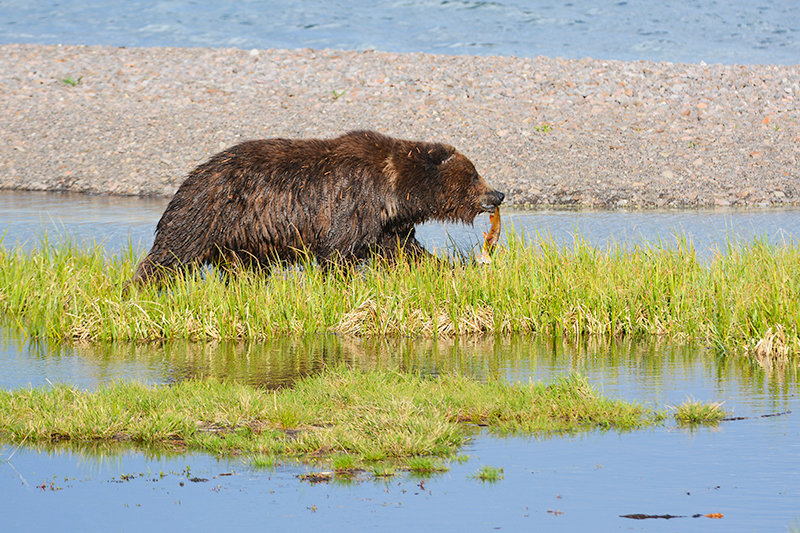
Under newly modified rules, the Wyoming Game and Fish Department is now able to transfer grizzly bears to government agencies and organizations outside the state, at least in theory.
The intent behind the revisions that the Game and Fish Commission approved last week is to further efforts to increase the connectivity between different populations of grizzlies — and possibly increase the chances of developing additional populations outside the Greater Yellowstone Ecosystem. A lack of genetic diversity among the Yellowstone area’s grizzly bears and the species’ reduced habitat have been a part of lawsuits, court decisions and legislative proposals aimed at keeping the population protected under the Endangered Species Act.
Commission Vice President Peter Dube said the change in policy is a response to lawsuits opponents complaining that the grizzly bear has not been re-established in a large part of its historical range.
“We’re saying, ‘Here you go, we’ll help you do that — if that’s what it takes to get the bear delisted,’” Dube said. “Will anyone take us up on it? I don’t know. Basically all we’re saying here is we’re opening up shop and are willing to do this.”
He added that Wyoming has “way too many” grizzlies.
Dube brought up recent news that California officials are mulling the possibility of reintroducing the species in their state. Last week’s policy change shows Wyoming’s support of their reintroduction efforts, he said. “The only one they have there is on their state flag.”
Tribes have also recently expressed an interest in having grizzly populations. During testimony on the proposed Tribal Heritage and Grizzly Bear Protection Act before a congressional subcommittee in May, tribal officials requested that bears be moved to sovereign tribal land.
Tom Rodgers, senior adviser to the Rocky Mountain Tribal Leaders Council, said the re-introduction of grizzlies on tribal land could help create opportunities, “from eco-tourism plans centered upon grizzly re-introduction ... to vocational opportunity for tribal members in the field of grizzly biology and management.”
“Returning the grizzly bear to participating tribal nations could be an economic lifeline to communities burdened by unemployment rates that routinely exceed 50 percent and above,” Rodgers said.
Scott Edberg, deputy chief of the Game and Fish’s wildlife division, presented the proposed revisions to the commission during their Nov. 19 meeting in Powell.
“It gives us more flexibility to deal with grizzlies as they increase [in numbers] and expand out of desired areas within Wyoming,” Edberg said. “It will give us one more tool in our toolbox.”
He asked the commission to support the changes to the state’s terrestrial wildlife policy (VII F) — as long as the translocation of the bear(s) doesn’t negatively affect the Greater Yellowstone Ecosystem’s population.
All requests would need to be vetted and approved by the department far in advance of bears actually being trapped and moved, he said.
“We’re not going to be saying, ‘Hey, we have a bear in a trap. Do you want it?’” Edberg said.
Research facilities and zoos are included in the list of possible destinations, but the current revisions don’t allow for commercial use of grizzlies translocated out of state. All costs of translocations would be the responsibility of those receiving grizzlies from Wyoming.
The changes may also help lower the number of lethal removals — or euthanizations — in the state.
“This may save some bears’ lives,” Dube said. “If we’re to the point that they become a trouble bear to us and we can’t take any more chances with it, maybe somebody else is willing to put them in an area where they won’t cause problems. It opens the door to other options [other than euthanization].”
The commission unanimously voted in favor of the revised policy. Despite the change, the entire process remains in the hands of U.S. Fish and Wildlife Service officials as long as grizzlies are listed for protections under the Endangered Species Act.
“Everything we currently do with grizzlies is under the direction of the U.S. Fish and Wildlife Service,” Dube said. “Whether we trap, move or remove a bear, we are the vessel to do it but they are the ones in charge.”
However, once the species is delisted, the changes may clear the path for the transfers without federal permission.
Delisting the species is the ultimate goal, Dube said. But he cautioned that “it’s a long way off.”
"fish" - Google News
November 29, 2019 at 10:25PM
https://ift.tt/33yKvUC
Game and Fish takes step toward transferring bears to other states - Powell Tribune
"fish" - Google News
https://ift.tt/35JkYuc
Shoes Man Tutorial
Pos News Update
Meme Update
Korean Entertainment News
Japan News Update
No comments:
Post a Comment